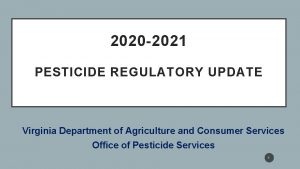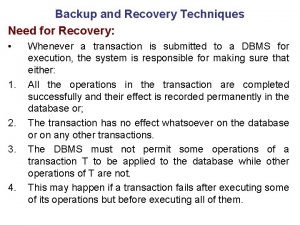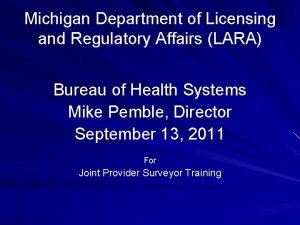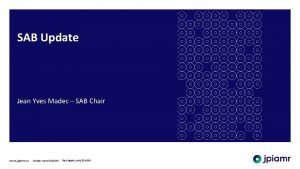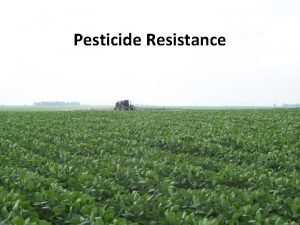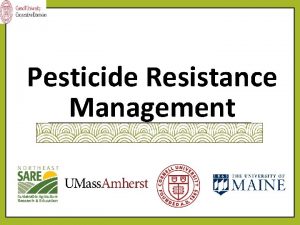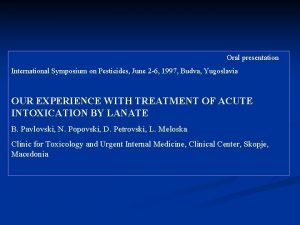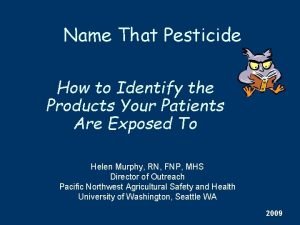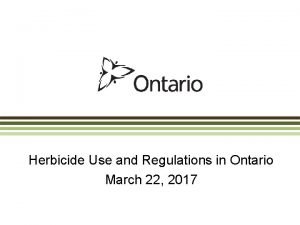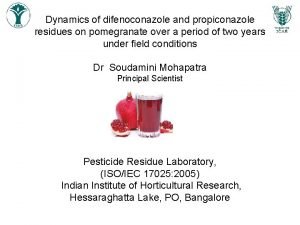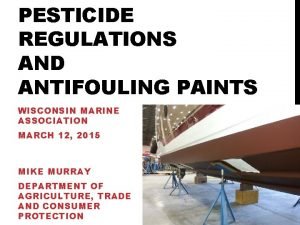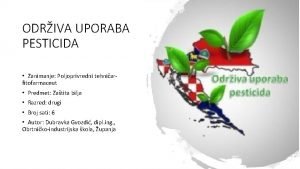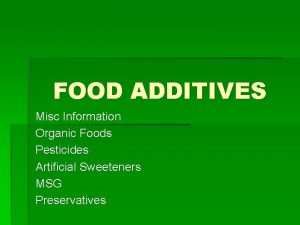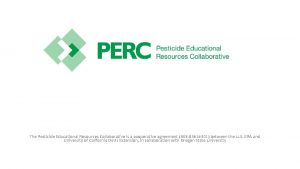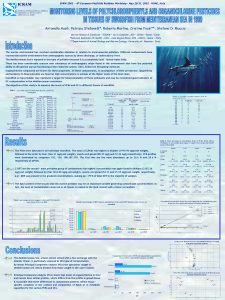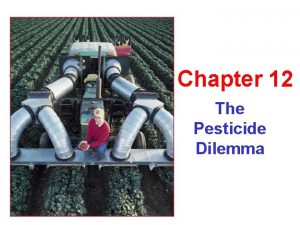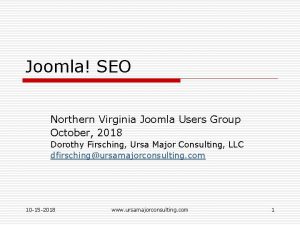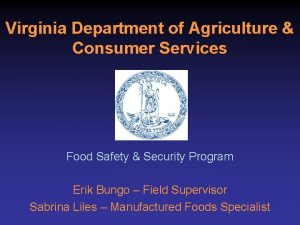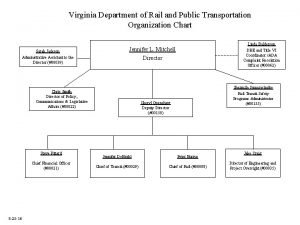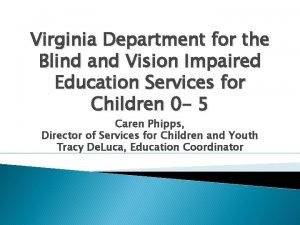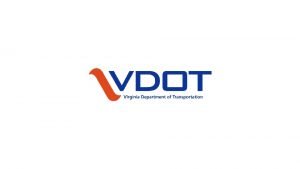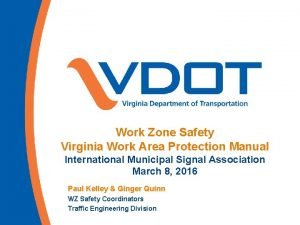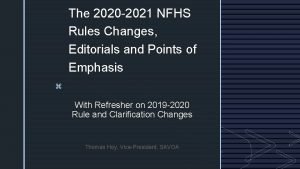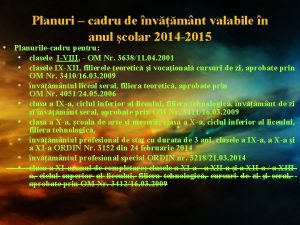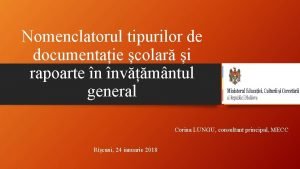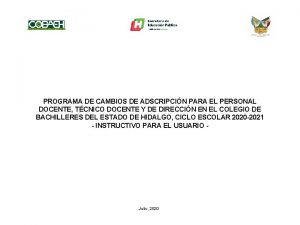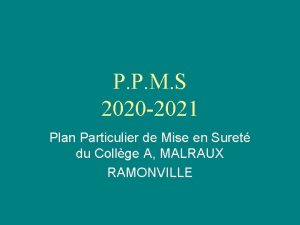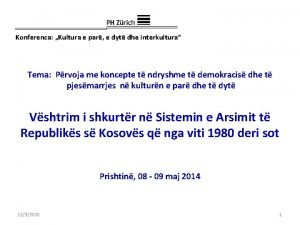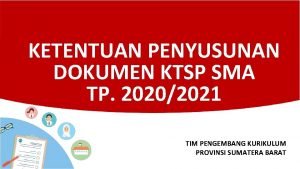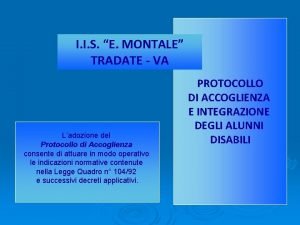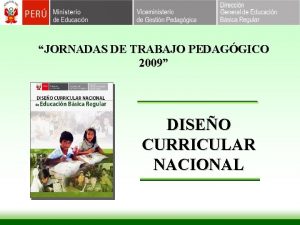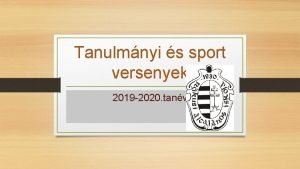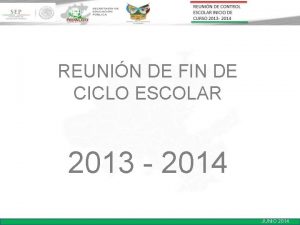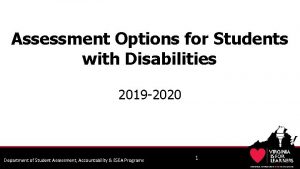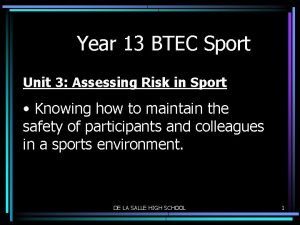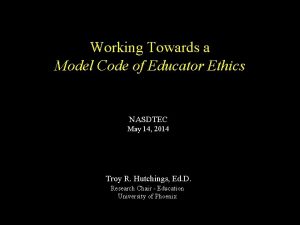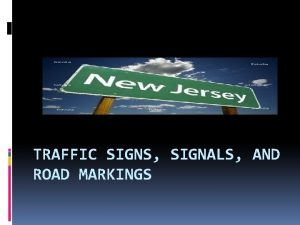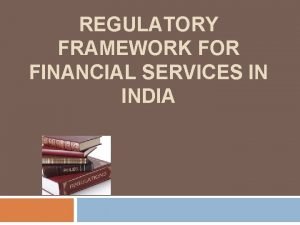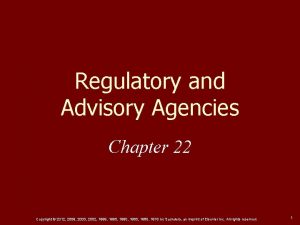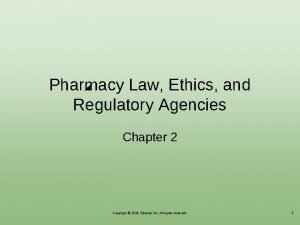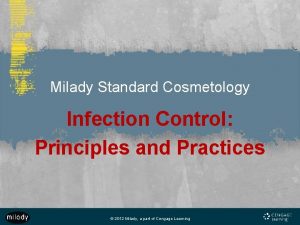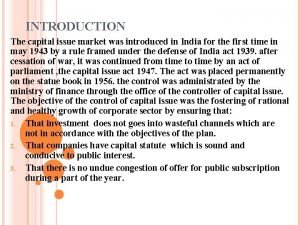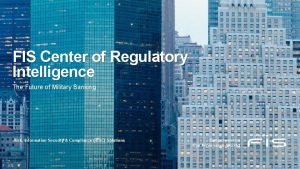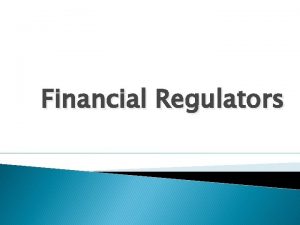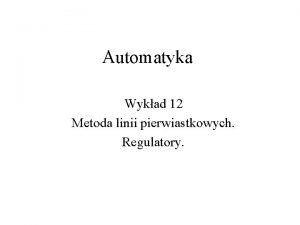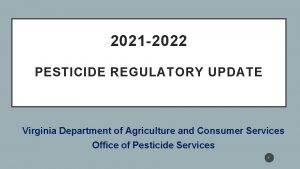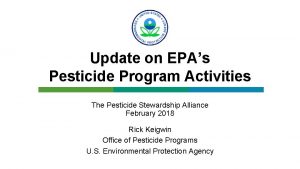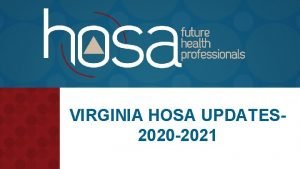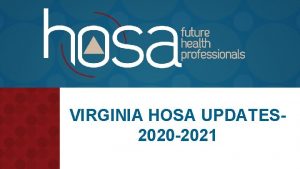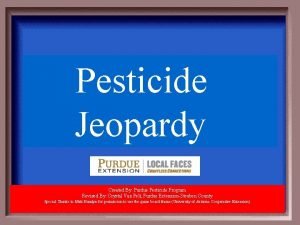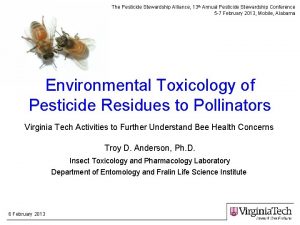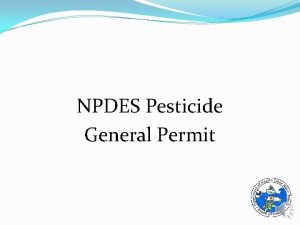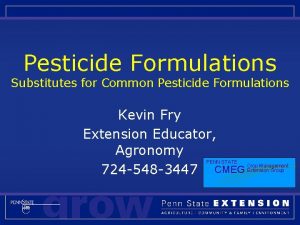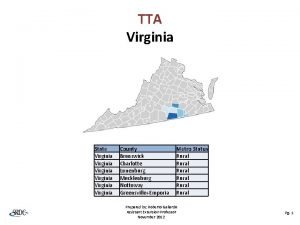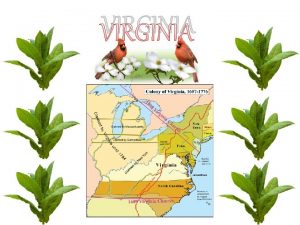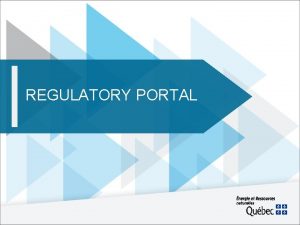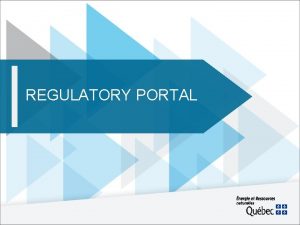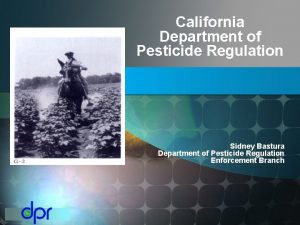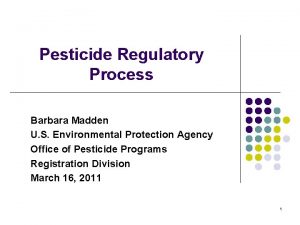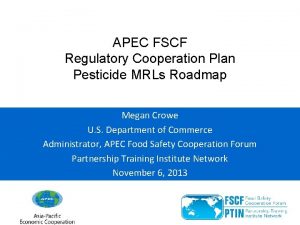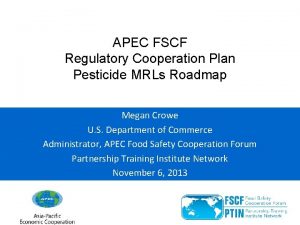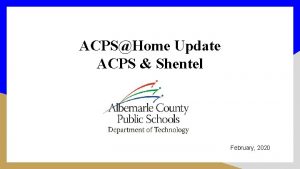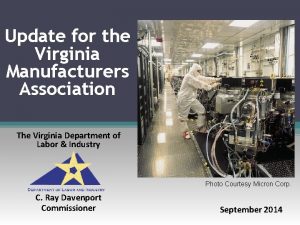2020 2021 PESTICIDE REGULATORY UPDATE Virginia Department of



































































- Slides: 67

2020 -2021 PESTICIDE REGULATORY UPDATE Virginia Department of Agriculture and Consumer Services Office of Pesticide Services 1

DISCUSSION POINTS • Regulatory Authority • Supervision • Common Violations & Enforcement Actions • Recordkeeping • Label is the Law • Pesticide Product Registration • Storage, Disposal & Recycling • Federal and State Regulatory Activities • Incident Reporting 2

OFFICE OF PESTICIDE SERVICES (OPS) • OPS activities provide support to Virginia Department of Agriculture and Consumer Services (VDACS) and the Board of Agriculture and Consumer Services (Board) that • Protect consumers and the environment; and • Ensure the safe and effective control of pests that adversely affect crops, structures, health, and domestic animals. • OPS authority is derived from the Virginia Pesticide Control Act (Act) and the Regulations Pursuant to the Act (Regulations). • Staff also has federal credentials to enforce provisions of the Federal Insecticide, Fungicide and Rodenticide Act (FIFRA). 3

REGULATORY AUTHORITY • Federal Law – Federal Insecticide, Fungicide, and Rodenticide Act (FIFRA) • State Law – Virginia Pesticide Control Act (Act) • Regulations Pursuant to the Act • Pesticide Product Registration, Handling, Storage, and Disposal • Pesticide Fees Charged • Licensing of Pesticide Businesses • Pesticide Applicator Certification • Pesticide Containers and Containment 4

ENSURING PROPER USE OF PESTICIDES • OPS conducts routine inspections and • Totality of evidence collected will be investigations to determine compliance reviewed in a two stage independent with all applicable laws & regulations; review process to determine if the • Standard inspection/investigation application was made in compliance with procedures may include: all applicable laws and regulations; • • Conducting interviews Visiting site Observing an application Taking photographs Collecting samples (residue/formulation) Collecting weather data Reviewing pesticide label and application records • Respondents will be notified of any alleged violations prior to any final enforcement action is taken; and • Should there be an enforcement action, for example, a monetary penalty, the respondent will have the right to appeal in keeping with the Administrative Process 5 Act.

VIOLATIONS ENFORCEMENT ACTIONS TYPES OF ENFORCEMENT ACTIONS VDACS can take enforcement action against any person, business or agency that violates any provision of the Virginia Pesticide Control Act, Regulations, or the Federal Insecticide, Fungicide and Rodenticide Act (FIFRA). • Letter of Caution • Civil Penalties per violation • Up to $1, 000 for a non-serious first time violation • Up to $20, 000 for knowing or repeat violations • Up to $100, 000 additional in the event of death or serious physical harm to any person. • Suspension, modification, revocation or denial of business license and/or applicator certification • Filing of criminal charges • Refer to U. S. Environmental Protection Agency 6 for federal action

FY 20 VIOLATIONS & ENFORCEMENT ACTIONS FOR NON-COMPLIANCE TOP 5 VIOLATIONS #1: Sale of Unregistered Product • Civil Penalties = 49 ($15, 330) #2: Not Certified • Stop Sale = 39 #3: No Business License • Letter of Caution = 4 #4: Misuse Including Negligence • Advisory Letter = 0 #5: Recordkeeping 1 July 2019 - 30 June 2020 7

§ 3. 2 -3930. Application and certification of commercial applicators… No person shall use … or supervise the use of any pesticide in exchange for compensation of any kind …. without first obtaining certification…. . § 3. 2 -3914. Registration required… Every pesticide. . sold, offered for sale, used, or offered for use shall be registered… 2 VAC-5 -685 Commercial applicators shall maintain records…. § 3. 2 -3932. Application and certification of priv. It is unlawful to use or supervise the use of any pesticide classified for restricted use on any property, unless… certification …as a private applicator… Read, Understand Follow the Act and Regulations! § 3. 2 -3939. Violations generally… to use or cause to be used any pesticide in a manner inconsistent with its labeling § 3. 2 -3924. Annual business license required… No pesticide business may sell, distribute, or store. . . No person may apply or recommend for use…without a pesticide business license… 2 VAC-5 -680 Pesticide businesses shall maintain a record of each pesticide… § 3. 2 -3940. Administrative Violations…. Applied any pesticide in a negligent manner… 8

APPEAL PROCESS: IF YOU DON’T AGREE INFORMAL FACT FINDING • Officer appointed by the Program Manager (Office of Pesticide Services) • Opportunity for respondent to offer additional information, ask questions • Officer is authorized to affirm, raise, lower, abate or negotiate a settlement • Decision can be appealed to FORMAL HEARING • Officer is Court appointed Attorney • Hears all relevant information and considers facts of all violations in the case • Makes recommendation to Board to affirm, raise, lower, abate or may recommend another outcome 9

THE LABEL IS THE LAW ALWAYS READ AND FOLLOW PESTICIDE PRODUCT LABELING It is a violation of Federal and state law to use any pesticide product in a manner inconsistent with its labeling. . . 10

THE LABEL IS THE LAW – “PESTICIDE USE” • In Virginia, "pesticide use" is defined as the application or supervision of an application of a pesticide. • This includes all of the routine activities that are part of a normal pesticide application: • mixing, • loading, • applying, • handling a pesticide after the container seal is broken, • clean up, and • storage and disposal of excess product & empty containers. 11

THE LABEL… • Is a legal agreement between the registrant, the EPA, the end-user and the State Lead Agency for pesticide regulation. • Mitigates the risk of the use of the pesticide to an acceptable level • Human Health • Environmental Health • Includes risk mitigation measures that may be implemented throughout label, for example: use rate; use site; PPE; weather conditions; buffer zones; storage; disposal, etc… • Prescribes proper use which ensures continued use and availability of pesticide. 12

Why read the label each and every time you use the product • Because… • Labels change…all the time. • The legal application of any pesticide is determined by the label on the container containing the pesticide that is used during a given application. • Product use limitations (for example, frequency of application, rate, and use sites) are specific to a product and may differ for other products containing the same active ingredient. 13

STORAGE • Store pesticides in original container in a well-ventilated area and away from food, pet food, feed, seed, fertilizers, and veterinary supplies. JUST SAY NO! • Avoid cross-contamination with other pesticides. Keep container closed to prevent spills and contamination • NEVER store pesticides, for even a short time, in a food or drink container. 14

PESTICIDE COLLECTION PROGRAM • The disposal of canceled, banned or unwanted pesticides poses a significant challenge to agricultural producers and other pesticide users due to its high cost. • Program Status • FY 2020 program collected a total of 26, 807 lbs. . • Since it’s inception, a total of over 1. 5 million lbs. has been collected For more information: . http: //www. vdacs. virginia. gov/pesticide-collection. shtml 15

2020 -2024 PESTICIDE COLLECTION PROGRAM 16

PLASTIC PESTICIDE CONTAINER RECYCLING • Provide agricultural producers, pesticide dealers and pest control firms with option for the disposal of properly rinsed pesticide containers. • Program Status • FY 2020 program recycled a total of 129, 560 lbs. . • Since it’s inception, a total of more than 2. 2 million lbs. . has been collected. For more information: http: //www. vdacs. virginia. gov/pesticide-container-recycling. shtml 17

INITIAL CERTIFICATION ON A RECIPROCAL BASIS (2 VAC 5 -685 -180 (A)) A person who is currently certified by another state or by a federal agency make written application to the commissioner, or his duly authorized agent, for issuance of a certificate on a reciprocal basis without examination…Along with his written application, an applicant shall…present an original certificate issued by the state of origin or issued by a federal agency…Reciprocal certification shall not be granted based on reciprocal certification issued in another state. 18

RECIPROCAL RECERTIFICATION (2 VAC 5 -685 -190) Reciprocal recertification shall be granted to outof-state applicators if they: (i) maintain certification in their home state; (ii) provide proof of current certification to the commissioner prior to the date of Virginia certification expiration; (iii) are currently certified in a state that grants reciprocal recertification to Virginia applicators in like categories; and (iv) have met all other Virginia requirements for recertification. RECIPROCAL RECERTIFICATION CREDIT: Applies to fewer states* than initial reciprocity, since it requires an agreement between the states: • West Virginia only allows initial reciprocity, not for recertification Others who refuse: AZ, WV • North Carolina permits this Others: GA, IN, NJ, PA, SC, UT *Will need to contact states not listed 19 If certificate lapses, cannot “re-reciprocate” without taking exams in VA. (applies to Virginia

REMINDER: CREDIT FOR RECERTIFICATION COURSE • Individuals must attend the entire course to receive recertification credit and complete all required forms as proof of attendance. Remember: A signature is required on both the roster and the recertification application. The signatures should not be significantly different. • Course sponsors/speakers seeking credit for attending their own course are required, like all attendees, to participate in the entire program and all sessions and complete all required forms as proof of attendance. • Course sponsors can not self recertify rather the course must include presenters others than the course sponsor. • To renew by attending a recertification training program requires completion of one recertification course every two years and submission of the renewal application and appropriate fees. * *Exception – Government employees and Private Applicators are exempt from renewal application and fees however must complete the recertification course requirement. 20

REPORTING REQUIREMENTS: ACCIDENTS AND INCIDENTS* • Certified commercial or private applicators or registered technicians shall report any pesticide accident or incident in which they are involved that constitutes a threat to any person, to public health or safety, or to the environment, as a result of the use or presence of any pesticide. • Includes both general use and restricted use pesticides. • No minimum amount. • Pesticide accidents/incidents should be reported to VDACS within 48 hours by phone and within 10 days in writing. • Reports include: • Name of individuals involved in accident or incident; • Name of pesticide involved; • Quantity of pesticide spilled and containment procedures; • Time, date, and location of accident or incident; • Mitigating actions taken; and • Name, or description if unnamed, and location of bodies of water nearby where contamination of such bodies of water could reasonably be expected to occur due to natural or manmade actions. *There may be other reporting requirements outside of the Act & Regulations… 21

PESTICIDE PRODUCT REGISTRATION ALL PESTICIDES • § 3. 2 -3914 of the Virginia Pesticide Control Act requires…Every pesticide manufactured, distributed, sold, offered for sale, used, or offered for use shall be registered … • Pesticides classified by EPA as 25(b) Exempt products are not exempt from state registration. • To check the state registration status of a pesticide or to find a registered pesticide for a specific pest visit the Pesticide Product Registration page of our website. http: //www. vdacs. virginia. gov/pesticide-productregistration. shtml RESTRICTED USE PRODUCTS (RUP) • For use only by certified (private or commercial) applicators or by certified registered technicians under the direct supervision of certified (private or commercial) applicators. • Restricted use products are designated as restricted use based on risk, for example: • Acute toxicity threat to humans & wildlife. • Ground water contamination concern. • Threat to aquatic organisms. 22

ECOMMERCE – BUYER BEWARE • Due diligence is required when purchasing pesticides via the internet. • Remember, all pesticides must be registered in Virginia…this includes those that are bought on the internet. • All pesticide businesses are required to have a license to sell pesticides in Virginia…this includes businesses that sell pesticides on the internet. • There are limited exceptions to the business license requirements for businesses • To check if a pesticide business is licensed to sell pesticides in Virginia: http: //www. vdacs. virginia. gov/pdf/reports-businesses. pdf 23

VIRGINIA REGULATORY ACTIVITIES • 2 VAC 5 -675 Regulations Governing Pesticide Fees On July 11, 2019, the following fee increases became effective: • The product registration fee increased from $160 initial and annually thereafter to $225 initial and annually thereafter; • The pesticide business license fee increased from $50 initial and annually thereafter to $150 initial and annually thereafter; • The certification fee for commercial applicators increased from $70 initial and biennially thereafter to $100 initial and biennially thereafter; and • The certification fee for registered technicians increased from $30 initial and biennially thereafter to $50 initial and biennially thereafter. Updated application forms are available on our website: http: //www. vdacs. virginia. gov/services-forms. shtml 24

APPLICATORS PROTECTING POLLINATORS VIRGINIA’S VOLUNTARY PLAN TO MITIGATE THE RISK OF PESTICIDES TO MANAGED POLLINATORS • Voluntary, proactive approach which focuses on enhanced communication and coordination between pesticide applicators and beekeepers. • Beekeepers providing information regarding the location of their hives; and • Pesticide applicators providing advance notice of applications that have the potential to impact managed pollinators. • To facilitate the communication, VDACS has acquired an online mapping tool: • Beekeepers can use Bee. Check™, Apiary Registry by Field. Watch® to map the location of their hives; • Agricultural producers and pesticide applicators can register with Field. Check to view the locations of hives in the application area and notify beekeepers of planned applications. To Register visit: http: //www. vdacs. virginia. gov/pesticides. shtml 25

PESTICIDE USE ON HEMP • All pesticides used on hemp must be registered federally by EPA or exempted • All pesticides used on hemp must be registered in Virginia including FIFRA 25(b) exempt products. • The labels must either list “hemp” as a use site, or the label language must be sufficiently broad to include hemp while not specifically prohibiting its use on hemp. • Additionally, for food uses • the active ingredient must be exempt from the requirements for a tolerance on all food crops, and; • have directions for use on unspecified food crops. 26

CERTIFICATION WHOSE RESPONSIBILITY IS IT ANYWAY? • For certified applicators including commercial applicators, registered technicians, and private applicators, it is YOUR responsibility to maintain your certification including being sure… • OPS has your current mailing address • Must complete a “Change of Information Form” to process any changes; • Know when your certification expires and renew your certification before it expires; • Attend a recertification course prior to the expiration date of your certification; • Sign your name on the course roster and complete and sign your recertification application form; and • Complete and sign your renewal application form and submit it along with fees. 27

COMMERCIAL APPLICATORS & REGISTERED TECHNICIANS Required additional information for all recertification courses for Commercial Applicator and Registered Technicians. 28

REMINDER: COMMERCIAL APPLICATORS& REGISTERED TECHNICIANS IT IS YOUR RESPONSIBILITY TO MAINTAIN YOUR CERTIFICATION • Recertification: – Continuing education required every 2 years, before your certificate expires – One class in your category is good for 2 years credit – Fall Status Reports for applicators needing recertification credit are mailed out by OPS – Check your status anytime http: //www. vdacs. virginia. gov/pesticide-applicator-certification. shtml • Renewal (not the same as recertification): – April Renewal Application and 2 -year fee due back to OPS by JUNE 30. – If you don’t renew by June 30, you are not allowed by law to apply pesticides. – After August 29, the only way to renew your certificate is by examination. 29

REMINDER: COMMERCIAL APPLICATORS & REGISTERED TECHNICIANS If you opt to test in lieu of attending a recertification course: • YOU MUST SUBMIT YOUR RENEWAL APPLICATION AND APPROPRIATE FEE; AND • YOU MUST SUBMIT A TESTING APPLICATION AND APPROPRIATE FEE. Two separate applications and two separate fees are required. 30

COVID-19 & APPLICATOR CERTIFICATION REQUIREMENTS LETTERS OF AUTHORIZATION • Expiration dates for all Letters of Authorization to take the pesticide applicator exam(s) issued on or after December 20, 2019 have been extended to January 31, 2021 or the expiration date on the authorization is greater. For more information, https: //www. vdacs. virginia. gov/pesticide-applicatorcertification. shtml REGISTERED TECHNICIANS • Licensed pesticide businesses can allow their employees to apply pesticides without obtaining a registered technician certification, for the duration of the state of emergency due to COVID-19, as declared by Governor Northam (Executive Order 51), when these employees meet certain training and testing requirements. 31

SUPERVISION REQUIREMENTS: REGISTERED TECHNICIANS • Only certified Commercial Applicators may supervise certified Registered Technicians (RT) • Certified Registered Technicians must have direct supervision by a certified Commercial Applicator to use Restricted Use Pesticides (RUPs) • Certified Commercial Applicators • Must provide instructions on safe use • Must be accessible within telephone or radio contact, or on site • Is responsible for actions of the RT • Certified Registered Technicians may use General Use Pesticides without supervision 32

SUPERVISION REQUIREMENTS: TRAINING REGISTERED TECHNICIANS • Only Certified Commercial Applicators may supervise the use of pesticides • Prospective pesticide applicators (persons in training) must have DIRECT ON-SITE supervision to use any pesticide • Certified Commercial Applicator • Must provide instructions on safe use • Must be on site • physically present on the property upon which the pesticide is being applied • in constant visual contact with the person applying the pesticide. • Is responsible for actions of uncertified person • Training must be documented and submitted to VDACS 33

TRAINING REGISTERED TECHNICIANS: PROOF OF ADDITIONAL CATEGORY SPECIFIC TRAINING • Only Certified Commercial Applicators may supervise the use of pesticides • The CCA trainer must submit a completed additional training form for the RT changing or adding categories. • Training must be documented and submitted to VDACS within 10 calendar days of completion of such training. 34

REMINDER: GOVERNMENT EMPLOYEES • All Government employees who apply pesticides are required to be certified: • Commercial Not-for-Hire; or • Registered Technician • Certification is valid only when applying or supervising application of pesticides used by such governmental agencies. • Do not work for a “pesticide business” so are not required to have a certified commercial applicator on Staff, however, only certified commercial applicators can train registered technicians. • That means, Governmental agencies need to: • Have a certified commercial applicator on Staff to train prospective registered technicians; or • Work with other Governmental agencies with a certified commercial applicator to train new prospective registered technicians; or • Hire or otherwise retain a certified commercial applicator to train prospective registered technicians. • In all cases, the certified commercial applicator must be certified in the category in which the registered technician will be working! 35

-CLARIFICATIONVOLUNTEERS MAKING PESTICIDE APPLICATIONS • That means…certification and • All state agencies, municipal corporations or other governmental recordkeeping requirements agencies shall be subject to the • Apply to persons who are not provisions… employees of the agency, but are authorized by the agency to • Individuals, employees or perform functions; and representatives…shall be certified as commercial applicators or • Include volunteers making a registered technicians for the use pesticide application under the of pesticides covered by the auspices of the government applicant's certification. • for example, state parks. 36

BUSINESS LICENSES WHOSE RESPONSIBILITY IS IT ANYWAY? • For pesticide businesses including those that sell, distribute, or store any pesticide or apply or recommend for use any pesticide commercially, it is the business owner/operator’s responsibility to maintain the pesticide business license including being sure… o OPS has the business’ current mailing address o Must complete a “Change of Information Form” to process any changes; o Know when the business’ license expires and renew the business’ license before it expires; o The business’ Certificate of Insurance is current and valid; o The business has, if applicable, a currently certified commercial applicator of record who is responsible for (i) the safe application of the pesticides; and (ii) providing recommendations for the use of pesticides; and o Businesses which sell restricted use pesticides, or distribute restricted use pesticides for purposes of selling, have a certified commercial applicator of record who is present and bears 37 immediate responsibility for the correct and safe operation of the location or outlet.

REMINDER: PESTICIDE BUSINESS LICENSES • All business licenses expire on March 31; • If not renewed by March 31, • The business is not licensed and cannot conduct business until such time as the licensed is renewed, for example, sell or apply pesticides; and • The certificates of all pesticide applicators working for the business are inactive, therefore, applicators may not apply pesticide until the business license is renewed. • Proof of insurance is required to maintain a business license. It is the business’ responsibility to ensure that a current certificate of insurance is on file throughout the license year: • If the certificate of insurance expires at any time during the year, the pesticide business license is considered unlicensed and cannot conduct business; and • The certificates of all pesticide applicators working for the business are inactive, therefore, applicators may not apply pesticide until the business license is valid. 38

PESTICIDE FEES : NON-REFUNDABLE AND NON-TRANSFERABLE • Fees are assessed to offset the cost of processing applications for: • Certified applicators (commercial & registered technicians); • Business licenses; and • Product registration. • Once applications are processed, regardless of if the credential is issued, fees will not be refunded. • Fees are transaction specific, thus, fees paid for one credential, for example, a prospective applicator, cannot be applied to a second prospective applicator. • Refunds, if due, are transaction specific. Refunds due cannot be applied to offset another fee. 39

RECORDKEEPING • Can someone look at this record and compare it to the label instructions? • Can you use the record to Cover Your Actions? 40

• There are 9 required elements: • Name, address, and telephone number of customer and address or location, if different, of site of application; • Name and certification number (or certification number of the supervising certified applicator) of the person making the application; • Day, month and year of application; • Type of plants, crop, animals, or sites treated and principal pests to be controlled; • Acreage, area, or number of plants or animals treated; • Brand, trademark, or product name appearing on the product's label; • EPA registration number; • Amount of pesticide concentrate and amount of diluent used, 41 by weight or volume, in mixture applied; and

HISTORY OF DICAMBA ISSUE • USDA registered Dicamba-tolerant seeds for use during the 2016 growing season. • EPA registered a new low-volatility Dicamba formulation for use on Dicamba-tolerant seeds in the fall of 2016 for use during the 2017 growing season. • As a result of the 2017 crop damage and large number of enforcement issues, the EPA put into place additional use restrictions for the 2018 growing season. • As a result of the continued crop damage and large number of enforcement issues during the 2018 growing season, the EPA has again put into place additional use restrictions for the 2019 and 2020 growing seasons. • On June 3, 2020, U. S. Court of Appeals for the Ninth Circuit ruled to vacate the registration for Dicamba use over the top on soybean and cotton, • On June 8, 2020 Environmental Protection Agency issued a final cancellation order for Xtendi. Max (Bayer), Engenia (BASF), and Fe. Xapan (Corteva Agriscience), prohibiting the sale of the products, while permitting use of existing stocks under certain circumstances through July 31, 2020 42

DICAMBA 2021 GROWING SEASON • On October 27, EPA approved new five-year registrations for two Dicamba products and extending the registration of an additional Dicamba product. • All three registrations include new control measures to ensure these products can be used effectively while protecting the environment, including non-target plants, animals, and other crops not tolerant to Dicamba. • Important control measures include: • Requiring an approved p. H-buffering agent (also called a Volatility Reduction Agent or VRA) be tank mixed with OTT Dicamba products prior to all applications to control volatility. • Requiring a downwind buffer of 240 feet and 310 feet in areas where listed species are located. • Prohibiting OTT application of Dicamba on soybeans after June 30 and cotton after July 30. 43 • Simplifying the label and use directions so that applicators can more easily determine

IMPLICATIONS OF DICAMBA’S “ONLY CERTIFIED APPLICATORS” PROVISION • Only certified (commercial and private) applicators may apply Dicamba over the top (Individuals working under the supervision of a certified applicator may no longer make applications); and • Virginia’s Certified Registered Technicians do not meet the federal definition of a certified applicator thus are prohibited from making applications of Dicamba (40 CFR Part 171). 44

DICAMBA – REQUIRED TRAINING • In Virginia, registrants (manufacturers) will continue to provide the Dicamba specific training required prior to the use of the products; • Both in person and on line training is acceptable; • Pesticide applicators may take any of the three registrant provided trainings to meet the training requirement; • Pesticide applicator training completed in another state including registrant training, state mandated training and state approved training will be accepted with appropriate documentation; • While we will accept training conducted in another state, that does not mean that another state will accept the registrant training taken by a pesticide applicator in Virginia. 45

PARAQUAT • Paraquat dichloride, commonly referred to as “Paraquat, ” is one of the most widely used herbicides in the United States. • It is an important tool for the control of weeds in many agricultural and non-agricultural settings. It is also used for desiccation of crops, like cotton, prior to harvest. • There are no homeowner uses and no products registered for application in residential areas. • All Paraquat products registered for use in the United States are Restricted Use Pesticides (RUPs) that may only be used by trained certified applicators • To prevent severe injury and/or death from Paraquat ingestion, all Paraquat products must: • Be used only by a certified applicator. Unlike most other restricted-use products, Paraquat may not be used by persons working under the supervision of a certified applicator. • Never be transferred to a food, drink or any other container. • Always be kept secured to prevent access by children and/or other unauthorized persons. • Never be stored in or around residential dwellings. • Never be used around home gardens, 46

IMPLICATIONS OF PARAQUAT’S “ONLY CERTIFIED APPLICATORS” PROVISION • Only certified (commercial and private) applicators may apply Paraquat (Individuals working under the supervision of a certified applicator may no longer make applications); and • Virginia’s Certified Registered Technicians do not meet the federal definition of a certified applicator thus are prohibited from making applications of Paraquat (40 CFR Part 171). 47

PARAQUAT – REQUIRED TRAINING • Certified applicators must successfully complete an EPA-approved training program before mixing, loading, and/or applying Paraquat. • The training must be retaken every three years. • The Paraquat training module emphasizes the importance of handling Paraquat safely because of its extreme toxicity. • Training can be accessed at https: //campus. extension. org/enrol/index. php? id=1660 • Available in both English and Spanish. • After taking the training, certified applicators will receive a certificate. 48

PARAQUAT EPA Proposes New Safety Measures • Paraquat is currently undergoing registration review, a program that re-evaluates all pesticides on a 15 -year cycle. • In October 2020, EPA released the Proposed Interim Decision. • Proposed changes include: • Prohibiting aerial application for all uses and use sites except cotton desiccation; • Prohibiting pressurized handgun and backpack sprayer application methods on the label; • Limiting the maximum application rate for alfalfa to one pound of active ingredient per acre; • Requiring enclosed cabs or PF 10 respirators if area treated in 24 -hour period is 80 acres or less; • Requiring a residential area drift buffer and 7 -day restricted entry interval (REI) for cotton desiccation; • Requiring a 48 -hour REI for all crops and uses except cotton desiccation; and • Adding mandatory spray drift management label language. • Allowing truck drivers who are not certified applicators to transport Paraquat when certain 49

PARAQUAT EPA PROPOSES NEW SAFETY MEASURES • The Agency is seeking public input on the Proposed Interim Decision. • The proposed interim decision for Paraquat is now available for public comment for 60 days. • Docket EPA-HQ-OPP-2011 -0855 at www. regulations. gov • Comment period closes on December 22, 2020. https: //www. epa. gov/ingredients-used-pesticide-products/paraquatdichloride 50

IF YOU DON’T KNOW…ASK US! Program Manager 804 -371 -6559 Environmental Programs 804 -371 -6561 Enforcement & Field Operations 804 -371 -6560 Certification, License Registration, & Training (CLRT) 804 -786 -3798 Compliance 804 -371 -8485 http: //www. vdacs. virginia. gov/pesticides. shtml Email: opsclrt. vdacs@vdacs. virginia. gov 51

PRIVATE APPLICATORS Required additional information for all recertification courses for Private Applicators 52

REMINDER: PRIVATE APPLICATOR CERTIFICATION IT IS YOUR RESPONSIBILITY TO MAINTAIN YOUR CERTIFICATION • Recertification: • Continuing education required every 2 years, before your certificate expires • One class in your category is good for 2 years credit • Fall Status Reports mailed out by OPS • Check your status anytime http: //www. vdacs. virginia. gov/pesticide-applicator-certification. shtml • Certificate expires December 31 • 60 days after certificate expiration (March 1) to recertify 53

RECORDKEEPING • Can someone look at this record and compare it to the label instructions? • Can you use the record to Cover Your Actions? 54

RESTRICTED USE PESTICIDES WORKER PROTECTION STANDARD Pesticide records must contain: 1. 2. 3. 4. 5. 6. Name of the pesticide applied, Active ingredient, EPA registration number, REI, Crop or site treated, Location and description of the treated area(s), Date(s) and times application started and ended, and 7. Safety Data Sheet of the pesticide applied. Pesticide records must be maintained for any covered use of a WPS labeled pesticide for either general-use or restricted-use pesticides. What records do I need to keep? The 9 required elements that must be recorded within 14 days of each RUP application are as follows: 1. 2. 3. 4. 5. 6. The brand or product name, The EPA registration number, The total amount applied, The month, day, and year, The location of the application, The crop, commodity, stored product, or site, 7. The size of area treated, 8. The name of the certified applicator, and 9. The certification number of the certified applicator. 55

FEDERAL WORKER PROTECTION STANDARD 40 CFR Part 170, Worker Protection Standard, Revised in 2015 • Goal to reduce pesticide poisonings and injuries among agricultural workers and pesticide handlers. • All requirements of the revised WPS are now in effect. • Related WPS resources, including the revised How to Comply Manual, are available online -EPA Worker Protection Standard webpage: https: //www. epa. gov/pesticide-worker-safety/agricultural-worker-protection-standard-wps -Pesticide Educational Resources Collaborative (PERC) http: //pesticideresources. org// • Contact Marlene Larios, Program Coordinator, at VDACS for assistance finding WPS resources. Email: Marlene. Larios@vdacs. virginia. gov or Phone: 804 -786 -8934 56

-APPLICATION EXCLUSION ZONEChanges Effective December 29, 2020 • AEZ requirements are limited to within the boundaries of the agricultural establishment, removing off-farm responsibilities. * • Includes clarifying language that pesticide applications that are suspended due to individuals entering an AEZ may be resumed after those individuals have left the AEZ. • Allows agricultural employers and handlers to make or resume applications when individuals are in an area subject to an easement, provided that the handler can ensure that the application will not contact those individuals. • Allows owners and their immediate family to shelter in place inside closed buildings, housing, or shelters within the AEZ during applications. • Allows handlers to make pesticide applications near closed buildings, housing, or shelters where the owner’s immediate family are sheltering-in-place, provided that the owner has expressly instructed the handlers that only the owner’s immediate family are inside the building or structure and that the application should proceed despite their presence in the AEZ. . • Simplifies the criteria for deciding whether pesticide applications are subject to the 25 - or *No changes were made to the “Do Not Contact” provision. 57 100 -foot AEZ.

HISTORY OF DICAMBA ISSUE • USDA registered Dicamba-tolerant seeds for use during the 2016 growing season. • EPA registered a new low-volatility Dicamba formulation for use on Dicamba-tolerant seeds in the fall of 2016 for use during the 2017 growing season. • As a result of the 2017 crop damage and large number of enforcement issues, the EPA put into place additional use restrictions for the 2018 growing season. • As a result of the continued crop damage and large number of enforcement issues during the 2018 growing season, the EPA has again put into place additional use restrictions for the 2019 and 2020 growing seasons. • On June 3, 2020, U. S. Court of Appeals for the Ninth Circuit ruled to vacate the registration for Dicamba use over the top on soybean and cotton, • On June 8, 2020 Environmental Protection Agency issued a final cancellation order for Xtendi. Max (Bayer), Engenia (BASF), and Fe. Xapan (Corteva Agriscience), prohibiting the sale of the products, while permitting use of existing stocks under certain circumstances through July 31, 2020 58

DICAMBA 2021 GROWING SEASON • On October 27, EPA approved new five-year registrations for two Dicamba products and extending the registration of an additional Dicamba product. • All three registrations include new control measures to ensure these products can be used effectively while protecting the environment, including non-target plants, animals, and other crops not tolerant to Dicamba. • Important control measures include: • Requiring an approved p. H-buffering agent (also called a Volatility Reduction Agent or VRA) be tank mixed with OTT Dicamba products prior to all applications to control volatility. • Requiring a downwind buffer of 240 feet and 310 feet in areas where listed species are located. • Prohibiting OTT application of Dicamba on soybeans after June 30 and cotton after July 30. 59 • Simplifying the label and use directions so that applicators can more easily determine

IMPLICATIONS OF DICAMBA’S “ONLY CERTIFIED APPLICATORS” PROVISION • Only certified (commercial and private) applicators may apply Dicamba over the top (Individuals working under the supervision of a certified applicator may no longer make applications); and • While the Worker Protection Standard allows handlers to apply pesticides under the supervision of a certified private applicator, given the changes to the Dicamba labels, handlers are not permitted to make applications of these products. 60

DICAMBA – REQUIRED TRAINING • In Virginia, registrants (manufacturers) will continue to provide the Dicamba specific training required prior to the use of the products; • Both in person and on line training is acceptable; • Pesticide applicators may take any of the three registrant provided trainings to meet the training requirement; • Pesticide applicator training completed in another state including registrant training, state mandated training and state approved training will be accepted with appropriate documentation; • While we will accept training conducted in another state, that does not mean that another state will accept the registrant training taken by a pesticide applicator in Virginia. 61

PARAQUAT • Paraquat dichloride, commonly referred to as “Paraquat, ” is one of the most widely used herbicides in the United States. • It is an important tool for the control of weeds in many agricultural and non-agricultural settings. It is also used for desiccation of crops, like cotton, prior to harvest. • There are no homeowner uses and no products registered for application in residential areas. • All Paraquat products registered for use in the United States are Restricted Use Pesticides (RUPs) that may only be used by trained certified applicators • To prevent severe injury and/or death from Paraquat ingestion, all Paraquat products must: • Be used only by a certified applicator. Unlike most other restricted-use products, Paraquat may not be used by persons working under the supervision of a certified applicator. • Never be transferred to a food, drink or any other container. • Always be kept secured to prevent access by children and/or other unauthorized persons. • Never be stored in or around residential dwellings. • Never be used around home gardens, 62

IMPLICATIONS OF PARAQUAT’S “ONLY CERTIFIED APPLICATORS” PROVISION • Only certified (commercial and private) applicators may apply Paraquat (Individuals working under the supervision of a certified applicator may no longer make applications); and • While the Worker Protection Standard allows handlers to apply pesticides under the supervision of a certified private applicator, given the changes to the Paraquat labels, handlers are not permitted to make applications of these products. 63

PARAQUAT – REQUIRED TRAINING • Certified applicators must successfully complete an EPA-approved training program before mixing, loading, and/or applying Paraquat. • The training must be retaken every three years. • The Paraquat training module emphasizes the importance of handling Paraquat safely because of its extreme toxicity. • Training can be accessed at https: //campus. extension. org/enrol/index. php? id=1660 • Available in both English and Spanish. • After taking the training, certified applicators will receive a certificate. 64

PARAQUAT EPA Proposes New Safety Measures • Paraquat is currently undergoing registration review, a program that re-evaluates all pesticides on a 15 -year cycle. • In October 2020, EPA released the Proposed Interim Decision. • Proposed changes include: • Prohibiting aerial application for all uses and use sites except cotton desiccation; • Prohibiting pressurized handgun and backpack sprayer application methods on the label; • Limiting the maximum application rate for alfalfa to one pound of active ingredient per acre; • Requiring enclosed cabs or PF 10 respirators if area treated in 24 -hour period is 80 acres or less; • Requiring a residential area drift buffer and 7 -day restricted entry interval (REI) for cotton desiccation; • Requiring a 48 -hour REI for all crops and uses except cotton desiccation; and • Adding mandatory spray drift management label language. • Allowing truck drivers who are not certified applicators to transport Paraquat when certain 65

PARAQUAT EPA Proposes New Safety Measures • The Agency is seeking public input on the Proposed Interim Decision. • The proposed interim decision for Paraquat is now available for public comment for 60 days. • Docket EPA-HQ-OPP-2011 -0855 at www. regulations. gov • Comment period closes on December 22, 2020. https: //www. epa. gov/ingredients-used-pesticide-products/paraquatdichloride 66

IF YOU DON’T KNOW…ASK US! Program Manager 804 -371 -6559 Environmental Programs 804 -371 -6561 Enforcement & Field Operations 804 -371 -6560 Certification, License Registration, & Training (CLRT) 804 -786 -3798 Compliance 804 -371 -8485 http: //www. vdacs. virginia. gov/pesticides. shtml Email: opsclrt. vdacs@vdacs. virginia. gov 67
 Virginia pesticide registration
Virginia pesticide registration Is an alternative of log based recovery
Is an alternative of log based recovery Department of licensing and regulatory affairs
Department of licensing and regulatory affairs Sab update.cim
Sab update.cim Define pesticide resistance
Define pesticide resistance Xxxxxxxxxx xxxxxxxxx
Xxxxxxxxxx xxxxxxxxx Lanate pesticide
Lanate pesticide Pesticide classification chart
Pesticide classification chart Ontario pesticide regulations
Ontario pesticide regulations Agriculture pesticide difenoconazole
Agriculture pesticide difenoconazole Wisconsin pesticide applicator license
Wisconsin pesticide applicator license Tablica za pesticide
Tablica za pesticide Msg pesticide
Msg pesticide Pesticide educational resources collaborative
Pesticide educational resources collaborative European pesticide residue workshop
European pesticide residue workshop Types of pesticides
Types of pesticides Seo northern virginia virginia
Seo northern virginia virginia Virginia department of agriculture food safety
Virginia department of agriculture food safety Virginia department of historic resources database
Virginia department of historic resources database Virginia department of rail and public transportation
Virginia department of rail and public transportation Virginia department for the blind and vision impaired
Virginia department for the blind and vision impaired Vdot wapm revision 2
Vdot wapm revision 2 Vdot work area protection manual
Vdot work area protection manual Virginia preschool initiative income guidelines 2020
Virginia preschool initiative income guidelines 2020 Gde strategic goals
Gde strategic goals Teacher goals for 2020-2021
Teacher goals for 2020-2021 Nfhs volleyball uniform rules 2020-2021
Nfhs volleyball uniform rules 2020-2021 Pra diploma utm
Pra diploma utm Bachillerato internacional ramiro maeztu
Bachillerato internacional ramiro maeztu Edu.ro programe scolare 2020-2021
Edu.ro programe scolare 2020-2021 Clements high school course selection 2020-2021
Clements high school course selection 2020-2021 Nomenclatorul documentatiei scolare 2020-2021
Nomenclatorul documentatiei scolare 2020-2021 Horizon 2020 2021
Horizon 2020 2021 Bayonne school calendar 2020-2021
Bayonne school calendar 2020-2021 Calendario escolar cobaeh
Calendario escolar cobaeh Ppms 2020 2021
Ppms 2020 2021 Masht planprogramet 2020 2021
Masht planprogramet 2020 2021 Dokumen 1 ktsp sma tahun 2020 2021
Dokumen 1 ktsp sma tahun 2020 2021 E montale tradate
E montale tradate Xxxx 2020 2021
Xxxx 2020 2021 Mapa curricular secundaria 2020-2021
Mapa curricular secundaria 2020-2021 Solanco powerschool
Solanco powerschool Tóth gábor
Tóth gábor Conest 2018-2019
Conest 2018-2019 Elmira city school taxes
Elmira city school taxes Fabbv restante
Fabbv restante Hosa
Hosa Seog grant
Seog grant Klein high course selection
Klein high course selection Shawnee public schools calendar 2020-2021
Shawnee public schools calendar 2020-2021 Vaap manual 2020
Vaap manual 2020 Btec sport level 3 unit 3
Btec sport level 3 unit 3 Dispositional framework vs regulatory framework
Dispositional framework vs regulatory framework Signs have three purposes, identify the three.
Signs have three purposes, identify the three. Regulatory framework of financial services in india pdf
Regulatory framework of financial services in india pdf Chapter 22 regulatory and advisory agencies
Chapter 22 regulatory and advisory agencies Chapter 2 pharmacy law ethics and regulatory agencies
Chapter 2 pharmacy law ethics and regulatory agencies Phenolic disinfectant are milady
Phenolic disinfectant are milady Functions of sebi
Functions of sebi Functions of financial system
Functions of financial system Regulatory change management process
Regulatory change management process Objectives of irda
Objectives of irda Managing diversity and regulatory challenges
Managing diversity and regulatory challenges Signs signals and roadway markings
Signs signals and roadway markings Basle ii
Basle ii Regulatory capital vs economic capital
Regulatory capital vs economic capital Metoda linii pierwiastkowych
Metoda linii pierwiastkowych Gene regulatory network
Gene regulatory network
